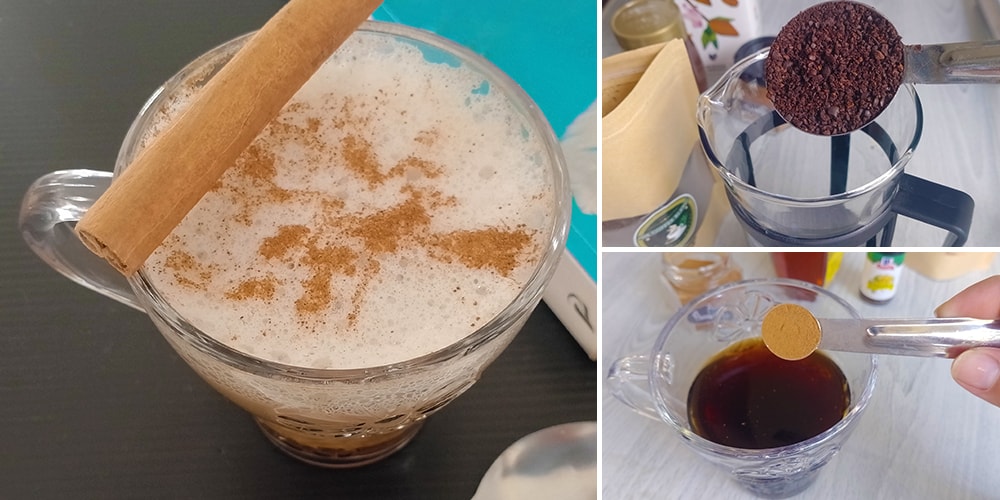
What Cinnamon Does to Senior Brains
Cinnamon always brings out something warm and welcoming like a reminiscence of grandma’s kitchen. From cinnamon rolls to eggnogs and gingersnaps, the spice kind of reminds you of laidback holidays, ginghams and wicker baskets.
Botanically speaking, cinnamon does give a kind of relaxation with its loads of healing benefits. Cinnamon is rich in nutrients which elevates the nutritional value of foods and drinks. It can also treat varied ailments with its therapeutic properties.
What Cinnamon Does to Senior Brains

Among its many benefits, cinnamon is known to improve cognitive functions according to research. It helps boost brain activity, reduce nervous tension and slow down its degeneration. It is essentially beneficial in seniors for supporting their aging brain and preventing or slowing down the symptoms of memory-related diseases.
Cinnamon is full of vital nutrients and compounds which support and reverse the effect of aging in elderly people.
Boost the Brain Activity
The biologically active ingredients in cinnamon like eugenol and cinnamic acid prevent the deposition of amyloid plaques. Amyloid is a naturally-occurring protein that clumps together in the neurons, disrupting its function. It is primarily the cause of Alzheimer’s Disease. AD can be prevented and slowed down by the antioxidant activities of cinnamon.
Reduce Nervous Tension
Anxiety, stress and emotional distress overexcite the nervous system causing tension. The imbalance in its function affects the cognitive functions of the brain. It causes one to have mood and behavioral problems. So, don’t take it with the elderly when they start behaving differently.
Giving cinnamon to seniors may help deal with this nervous tension. Cinnamon is an adaptogenic spice that helps the body manage stress and restore its balance. It decreases nervous tension and improves behavioral states.
Prevent Memory Loss
Alzheimer’s Disease is a type of dementia or brain disorder that manifests itself by loss of memory. But sometimes, memory and thinking problems are not necessarily caused by brain disorders. It may be due to emotional distress, vitamin deficiency, reaction to medication or underactive thyroid.
Cinnamon contains trace amounts of nutrients like vitamin B12 to support brain and nervous functions. It can help with reversible memory problems and prevent nervous degeneration which may cause memory loss in seniors.
Slow Down Aging
As people age, certain parts of the brain like the myelin shrink causing a disrupted communication between neurons. The messages are then passed on slower than they had been in their prime. You will notice these changes in the elderly when they lose the ability to multitask, learn something new and remember things.
Cinnamon is an effective antiaging botanical and has a positive effect on seniors. It contains cinnamaldehyde that reverses this cognitive decline. It is also useful in preventing dementia.
Improve Blood Circulation
Cinnamon inhibits the formation of arachidonic acid or inflammatory fatty acids. These fats can deposit in the arteries and cause blockage which may disrupt the heart and body functions. Cinnamon prevents these fats from accumulating in the bloodstream. Reducing blood clots boosts blood circulation for the benefit of the brain and the entire body.
Other useful herbs for brain health are Cordyceps, Lion’s Mane, Reishi and Lemon Balm, whose health benefits include boosting cognitive function, limiting neuronal cell death, enhancing memory and focus, calming anxiety and stress, combating fatigue, and boosting energy. This Brain Bundle includes dual-extracted tinctures of Cordyceps, Lion’s Mane, and Reishi medicinal mushrooms, plus Lemon Balm.
Other Health Benefits of Cinnamon for Seniors
Aside from supporting brain health, cinnamon is also beneficial for the following:
Stabilize Sugar Levels
Cassia cinnamon is the most effective species of cinnamon when it comes to controlling blood sugar levels. It can help increase insulin sensitivity and improve the glucose level for the benefit of patients with Type 2 Diabetes. Cinnamon also slows down the stomach emptying to prevent the spike of sugar after meals. Researchers see positive results in cinnamon’s regulation of blood sugar levels and may help reverse diabetes.
Reduce Triglycerides and Cholesterol
Triglycerides are lipids or fats that store unused calories and provide energy. It is different from cholesterol which is a waxy substance produced in the liver. Often, the spike in triglycerides also affects the cholesterol level causing problems like hardening of the arteries (atherosclerosis).
Research studies show significant results in reducing both triglycerides and cholesterol concentrations after cinnamon supplementation. This helps reduce the risk of contracting cardiovascular diseases.
Relieve Arthritis
Cinnamon is not only a warm and homely aromatic spice. It is also an analgesic and possesses an excellent anti-inflammatory property that helps alleviate joint pain and stiffness. Owe it to the cinnamaldehyde and cinnamic acid present in cinnamon that relieves arthritis pain and reduces oxidative stress.
Differentiating Cinnamon
Cinnamon in supermarkets is available in powdered form, stick or bark. They came from the bark of the tree Cinnamomum.
Cinnamon has two different types: Ceylon and Cassia. They are referred to as the True Cinnamon and Chinese Cinnamon respectively. Some people may refer to cassia as the fake cinnamon but should not be taken as an underestimation of its potency.
Cinnamon Ceylon is harvested from the trees grown in Sri Lanka, Madagascar, the Caribbean, India and Brazil. They have a sweet taste but a milder aroma. Ceylon is smooth and tan. It rolls paper thin and is brittle that it gets broken easily.
Cinnamon Cassia came from China and Vietnam and has a pungent aroma. It has a thicker bark that is not easily peeled off and has a darker, deep brown color.
Ceylon vs Cassia Cinnamon
From the comparison, you can infer that the cinnamon you buy from stores is likely Cassia. True cinnamon is expensive and you can buy it from reputable stores labeled as Ceylon Cinnamon.
Both Cassia and Ceylon are healthy cinnamons but with defining differences. Cassia contains a slightly higher level of coumarin than Ceylon. It is what gives cassia its darker hue and scent. Coumarin is a phenolic compound that promotes blood circulation and prevents blood clots. However, its primary concern is its potential to damage the liver.
So, is it safe to take cassia?
Definitely. As long as you take it at a limited dose and for a short period. When taken in low doses and food amounts, cassia cinnamon is still a powerful neuro-protective spice among its other therapeutic benefits.
Dosage and Contraindications
Cinnamon is a haven of therapeutic benefits. But, overindulging in it can cause unnecessary stress for the liver. Even Ceylon cinnamon contains coumarin that can harm the liver when taken excessively.
Preliminary studies suggest a daily dosage of cinnamon not exceeding 6 grams. The suggested daily dose for oral intake of cinnamon are as follows:
- 1 to 6 grams cassia powder for up to 4 months for diabetes
- 2 to 6 grams dried bark
- 3 to 7 ml tincture
- 0.05 to 0.2 ml essential oil
- 1 tsp = 4.75 grams cinnamon powder
If you are taking diabetic medications, antibiotics, blood thinners and heart medicine, talk to your doctor first before taking cinnamon supplements. Cinnamon may affect the way these drugs behave and doctors may need to adjust the treatment when necessary. Generally, cinnamon is safe when taken within the recommended food amount.
Brain-Boosting Cinnamon Latte Recipe
Stir up this relaxing all-weather coffee-based cinnamon beverage. Caffeine, although purported as the bad guy for blood pressure and heart health, is actually healthy when taken in moderation. It improves the stimulatory effect of the nervous system to boost cognitive function.
Seniors may find this beverage a good way of enjoying a relaxing brain-boosting morning cup. You can even try this recipe yourself wherever you are in this walk of life.
What you will need:
- Coffee maker
- Milk pot
- Milk frother or whisk
- Large spoon
- ¾ cup almond milk
- ¼ cup coffee
- ¼ tsp cinnamon powder
- 1/8 tsp vanilla extract
- 3-4 tsp honey or maple syrup
Steps:
- Prepare your coffee according to your preference. You can use 1 to 2 shots of espresso if you prefer a strong cup. Otherwise, you can prepare it to your desired strength using a French press or drip coffee maker. For this recipe, I made a regular brew with 2 tbsp medium-coarse coffee grounds and 1 cup boiling water.

- Pour the coffee in a mug and add vanilla, cinnamon and honey. Stir the mixture well.

- Heat milk in a milk pot until hot but not boiling. Froth the milk until foamy.

- Tap the milk into the counter to separate the liquid. Using a large spoon to hold the foam, slowly pour milk over the coffee-cinnamon mixture. Scoop out the foam and top it with the coffee and sprinkle with cinnamon powder.

If you do not fancy frothing your milk and all, just go ahead and prepare your usual cup of coffee. Dump the rest of the ingredients, mix well, and enjoy.
Although Ceylon cinnamon is said to be more botanically useful, cassia can also fare up to its potency. They have a slightly similar flavor profile that varies in intensity. The FDA presently does not distinguish cinnamon. What you usually see in stores is understood to be Cinnamon cassia unless labeled otherwise.
Cinnamon is one of the pantry staples you can easily reach out as a medicine. If you are having brain fog and feeling a little slow lately, you may also try adding cinnamon to food and drinks. Use it in moderation and you will reap the best benefit from this warmly aromatic spice, especially for brain support.

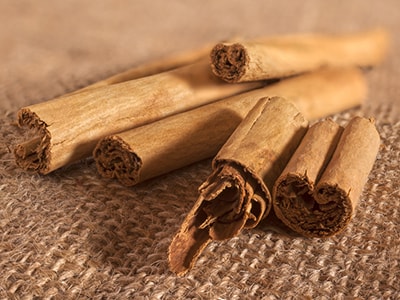
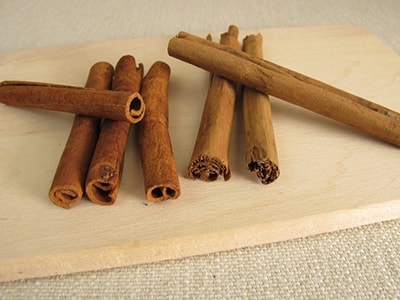
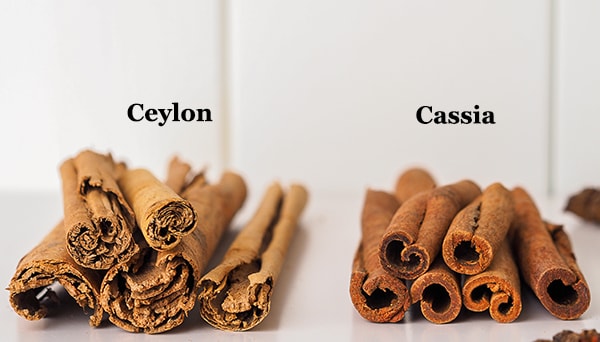
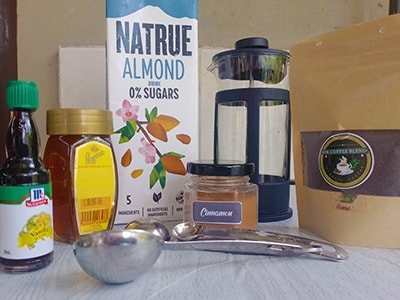
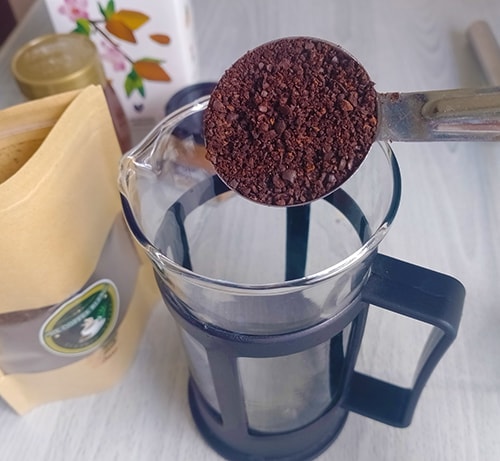
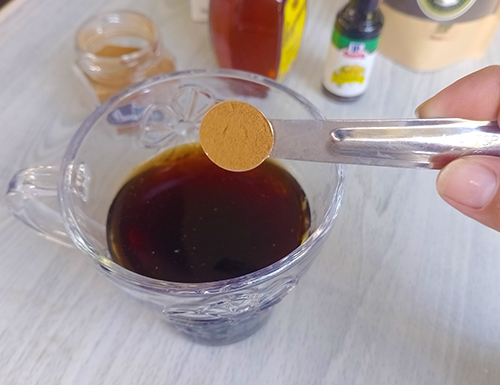
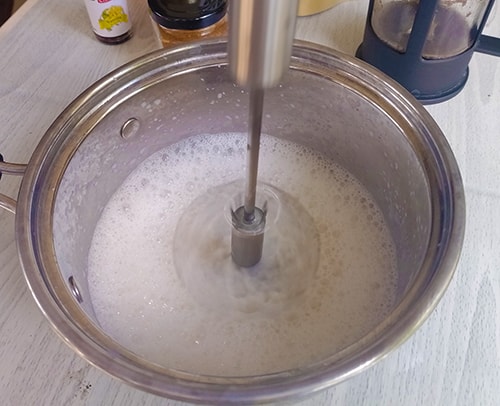
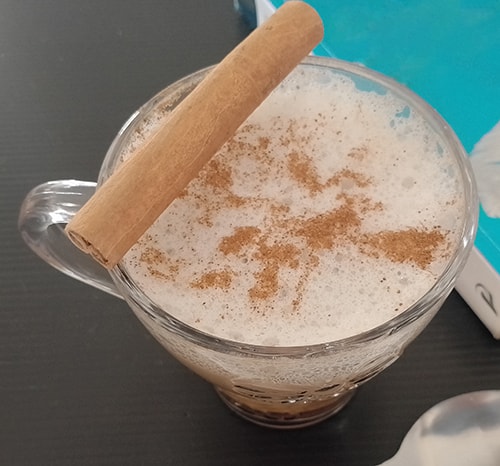

Cassia cinnamon bears some responsibility for causing the death of my beloved cockatoo. Most parrot websites said cinnamon was a good thing to give your parrot to chew on. So I broke a piece off of the cinnamon sticks one gets at the grocery store to give him every day. After about 2 weeks he began regurgitating a clear liquid with the consistency of egg white. We live not far from Iowa State Veterinary Collage and in many trips there we spent the next year trying to save his life before a bad overnight internal bloody hemorrhage left him barely clinging to life the next morning and we had to give up and euthanize him. An autopsy showed an enlarged liver, and an ulcer in his stomach, from which started an occult infection under the stomach lining, a persistent, nasty kind of secondary candida infection, and damage to his intestinal lining. It wasn’t until after this began that I found out there were two kinds of cinnamon and the one they sell everywhere for baking is much stronger. I still use cinnamon, but I’ve been leery of it ever since.
Donna, thank you so much for your post. I have 8 parrots and give them a small piece of my banana nut bread which I add cinnamon…Macaw, two umbrella cockatoos, 3 African greys and 2 double yellow Amazons. I will certainly cease giving them any food with cinnamon. I think I have seen cinnamon in commercial dry bird food but not sure. You may have saved me a lot of vet bills. Thank you from the bottom of my heart. I’m so sorry you lost your feathered friend.
Hi Donna,
We are very sorry to hear about this! We thank you for spreading the word about the dangerous effects of cinnamon on our beloved pets.
Many blessings and good health!
I have been concerned about the heat and/or chemical processing of spices that are imported. Is this still being done and how is that affecting the brain and other bodily functions?
As i was reading the topic, i was wondering “types of cinnamon”. I only know two: Ceylon and Cassia but i learned here that like anything we eat, we should not overindulge; and i still can buy the common Cassia and not be worried picking that over Ceylon.
Also the comment below of someone losing a beloved cockatoo, chewing the cinnamon bits was heartbreaking but so important to know too.
I am looking for DIY recipes for solutions for calisus and warts. Do you have any ideas because I don’t want to go to the doctor since they won’t do anything and stores are too expensive.